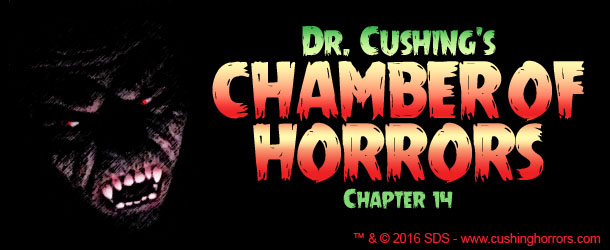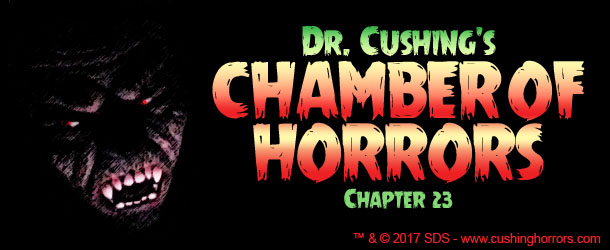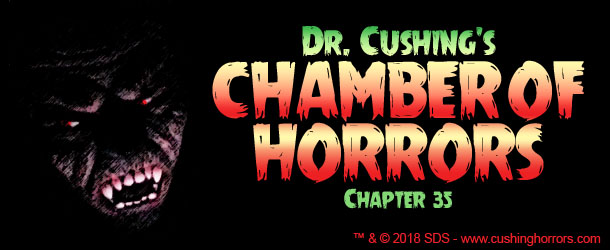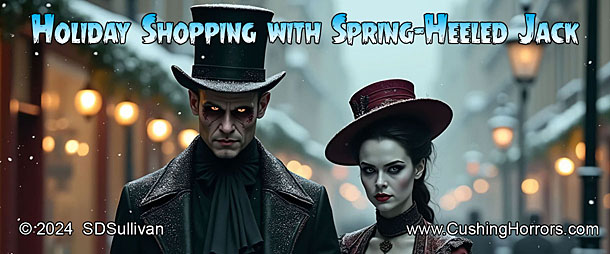
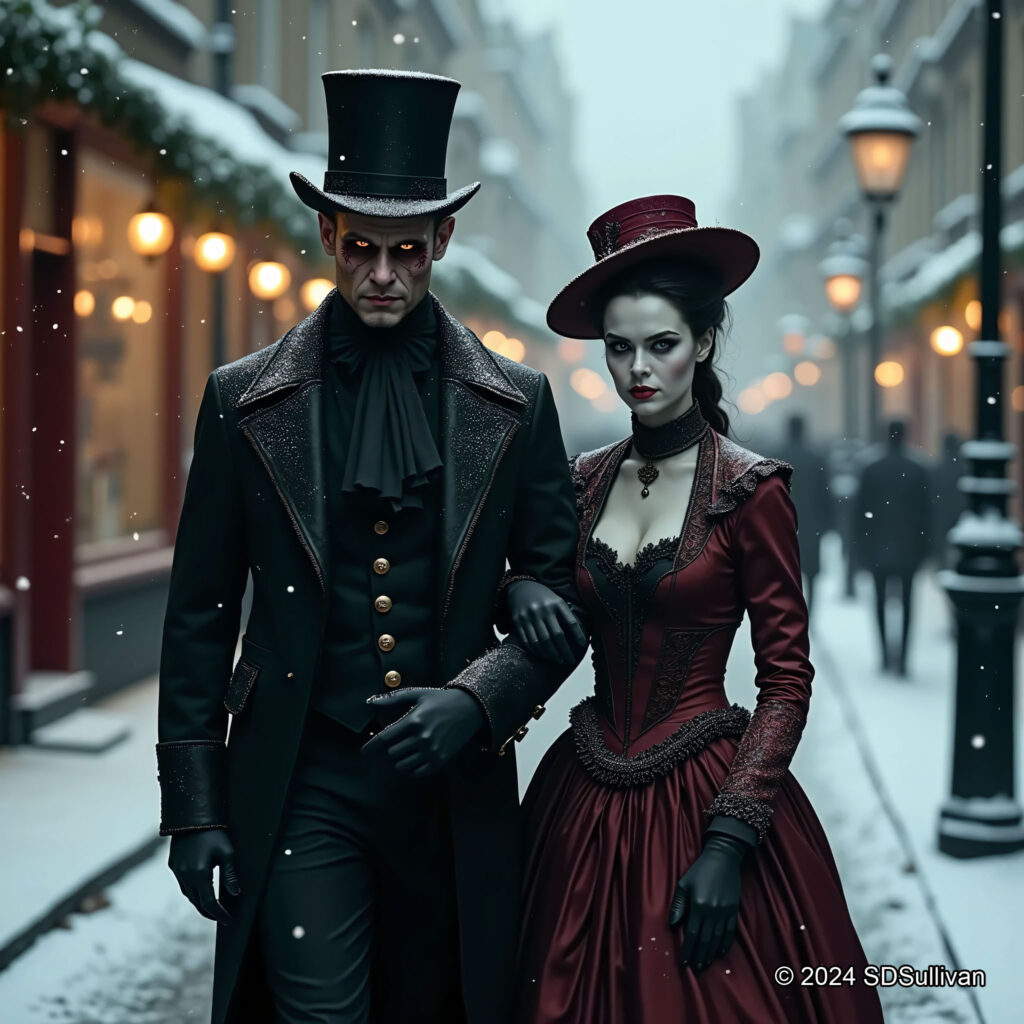
“Holiday Shopping with Spring-Heeled Jack”
A Dr. Cushing’s Chamber of Horrors Prequel
by Stephen D. Sullivan
1847 – London
Since the day I crawled out of my premature grave, I’ve always liked snow.
The cold of that awful evening in December fifty-one years ago affected me little more than the chill of the London Holiday Season now, but the wonder of seeing my first snowfall… That’s a joy I anticipate every autumn and relive with each new winter.
Tonight, delicate flakes danced and whirled in the dark air, sparkling near the streetlamps and in the warm lights leaking out of the storefronts on Oxford Street. Fluffy powder dusted everything, giving the shops, the walkways, and even the wide thoroughfare itself a white-wrapped luster.
I hiked up my long burgundy skirts and stepped lively with my fashionable boots, avoiding the piles of slush quickly accumulating at the kerbs of the avenue’s granite-set pavement. My companion strode through the wet drifts, unperturbed.
The snow hushed the world, dulling the click of our heels, the clop of horseshoes, and the noise of cheery conversations. (I recognized a half-dozen languages, besides various English dialects.) It also, thankfully, blunted the lingering odor of both horses and humans bustling about their Christmastime business.
With the smells of the city thus dampened, the winter breeze wafted enticing aromas from the bakeries, confectioners, public houses, and street vendors to my eager nostrils.
I tipped my head back, inhaled the frosty air deeply, and caught a few delicious flakes on my tongue, not caring that my display might seem unladylike.
One frosty crystal found its way around my collar and landed on the pit of my neck. The icy sliver took a long moment to melt against my reanimated flesh. I didn’t mind in the least.
“Shove off, ya little malcontent!” Jack’s deep voice grumbled from beside me, replying to a query that—in my snow-dappled revelry—I hadn’t heard.
“Please, sir… Just a tuppence?” a tiny voice repeated. “Or a penny… Even a ha’penny, sir?”
“I said, ‘Shove off!’” Jack barked.
I laid my hand on the elbow of his bulky woolen overcoat as I refocused my eyes on the urchin blocking our way forward.
She couldn’t have been more than six or seven years old, with hair like uncut straw and blue eyes surrounded by deep black circles. Her dun clothes hung on her thin frame in little more than tatters. To most people here, she must have been a ghastly sight; I noticed other shoppers giving us wide berths as we conversed with her. (If you could call Jack’s mutterings conversation.)
But I had looked worse myself—far worse.
A firm squeeze on my companion’s muscular arm stopped him as he inched back his right leg for a good swift kick. He still had so much to learn of human ways… As did I.
“Now Jack,” I cautioned, “mustn’t be hasty.” I fixed him with a stern gaze of my yellow-green eyes, the mere color of which has caused grown men to blanch.
The red fireballs that returned my look dimmed a little in Jack’s sunken eye sockets. “Yeah. Awright. Whatever ya say, Dr. Schreck.”
I winced inwardly at the use of one of my former monikers, not that the name would mean anything to the waif begging for pennies.
“Doc-tor…” the girl muttered in awe. “Blimey! I didn’t know ladies could be sawbones!”
“They can in Germany, where I learned,” I replied, though that was only partly true. I’d studied the surgeon’s arts in battlefields across the continent for the past few decades, though Germans had certainly been responsible for much of my learning. I should have probably been more grateful for my tutelage, rather than ruing the carnage that made it possible. Where else but in a war would somehow who appeared as ghastly as I did then have seemed useful, or even acceptable?
But being lovely has never been required to minister to the dead and the dying. And the badly wounded will see even a haggard wretch as an angel of mercy. Thus, my appellation had gone from Mary Schreck—which means “fright”—to Dr. Schreck to Dr. Angela, which I much preferred. And with my new skills in surgery had come personal improvements, as well. Otherwise, this small girl would likely have run, rather than staring at me in wonder.
I crouched, careful not to soil my skirts, bringing my eye level closer to hers, as I reached into my purse. “What’s your name, little one?”
“Mary.”
My heart twinged. Same as mine; same as the girl whose life I’d saved before futilely pursuing my creator, Dr. Frankenstein, and his other “monster”—my presumed mate—across swaths of Europe. That endeavor ended tragically. I’ve made my own way ever since.
I like to think that I’ve done better than my forebears, though sometimes I have my doubts.
“That’s my name, too,” I replied kindly, trying not to let my smile become too ghoulish. “Well, Mary… Here’s a few pennies for you.”
I pressed five of the precious coins into her palm. Her hand felt cold, perhaps as cold as mine, though I could still sense the vital flame within her. With time and nourishment, that ember might burn bright. I hoped my small contribution would make a difference.
The girl’s eyes widened, and her grin nearly split her small face in half. “Thank you, ma’am!”
I kept hold of her, gently not urgently. “We’re helping host a Christmas meal for those who might be hungry—down at the meetinghouse in the old Gordon textile warehouse on Dyott Street, tomorrow night. Do you know it?”
Little Mary nodded.
“Please come. There will be warm food and drink, biscuits, and perhaps other treats as well.” I let the primal spark within me warm my hands, sending her encouragement. “Bring your family, if you have any.” I tried to be kind as I said this last, knowing that many in the Saint Giles rookery—not too far from here—were orphans or lived in situations even more dire.
Because wasn’t extending hope and compassion to such unfortunates one of the messages in Mr. Dickens’ book of a few years back?
“Oh, yes, ma’am,” the girl said, clutching her new treasures tight. “I’ll tell me mum, an’ me brothers an’ sisters, too, if we can find ’em!”
With that, she hurried off into the darkness, pedestrians veering out of the way as she went. “Thank you, ma’am!” she called. “Thank you, Dr. Mary!”
I waved goodbye as I stood.
Spring-Heeled Jack scowled at me—one of his favorite expressions.
“She’ll just come whimpering back for more,” he observed. “Probably bring some brats with ’er, next time. You shouldn’t encourage ’em.”
I laughed. Jack flinched, though I’d spent considerable time learning to make my laughter seem human, and felt sure I sounded quite pleasant. At the base of it, I don’t think he liked laughter, possibly because most of his laughs could peel wallpaper and make grown men flee, soiling themselves.
“Holiday spirit, remember, Jack?” I chided. “How will you ever learn to be human if you can’t find your holiday spirit?”
“Not sure I want to,” he replied, his voice like cold gravel.
“So, you prefer to be an outcast your whole life?”
“Worked for me before you came along, Dr. Schreck.”
“If by ‘worked’ you mean being despised and hunted everywhere you went,” I teased. “Really, Jack… I sometimes think you wish we’d never met!”
A low rumble rose from my companion’s throat, and his blazing eyeballs glanced sideways at me. “I wouldn’t quite say that…”
I laughed again—to the same flinching response—happy that I’d had at least some civilizing effect on my fellow homunculus.
Jack wasn’t the first supernatural manifestation to run amok in the good old city, and I doubted he’d be the last. (They tend to crop up every half century or so, according to my research.) Spring-Heeled Jack, at least, had me to take him in hand.
He’d been quite the terror when I first encountered him—summoned from perdition-only-knew-where by a wizard-cum-alchemist named Barrett—running wild, jumping out of the shadows to scare the wits out of unsuspecting Londoners, tearing the clothes of young women…
No wonder he’d had to spend nearly all his time hiding in shadowed alleyways or bounding away from policemen with the prodigious leaps that earned him his sobriquet.
I’d put a stop to all that.
My only reward so far…? The occasional hint that Jack desired to mingle among humanity’s teeming masses nearly as much as I did. Because really, what monster doesn’t long to be “normal?”
“Something to eat will cheer you up,” I declared as we resumed our promenade. “And I see just the thing up ahead.”
Jack seemed skeptical as we approached the small cart of the street vendor.
“Chestnuts, sir…? Ma’am…?” the middle-aged proprietor asked. He sported a weathered coat and cap as well as a cooking apron, from which most of the stains had been successfully laundered. He’d clearly made an effort to appeal to the better-off shoppers on Oxford Street, and he didn’t smell bad—not even to my keen senses.
And his roasted wares smelled heavenly: nutty and sweet and oh so warm. Just the thing for a chilly December evening.
“Yes, please,” I said, handing over the pittance he asked for our treat.
Mine he put into the small basket I’d brought along for just such a circumstance; Jack merely held out his hands. Thankfully, the vendor didn’t notice the sharp claws starting to poke through my companion’s gloved fingertips.
“They’s hot, sir,” the Chestnut man warned.
“I like ’em hot,” Jack replied. The start of my companion’s grimace-like smile made the salesman shudder as he dolled a fistful of hot chestnuts into Jack’s outstretched palms.
“Thank you kindly.” I tipped my hat, hoping that my practiced smile would distract from Jack’s fiendish one.
The ploy worked. “You’re welcome, m’lady,” the vendor said, tipping his hat in reply.
Taking Jack by the elbow, I steered us toward our next destination.
Jack popped one of the nuts into his mouth and crunched it, not bothering to shell or peel it first.
“Not hot enough,” he announced.
And before I could stop him, he breathed a gout of blue flames onto the chestnuts in his palms.
“Jack!” I interposed my body between him and the other shoppers, turning both of us toward the display window of the nearest shop, hoping that no one on the street—or in the shop—would notice his antics. “We’re supposed to be human, remember?”
Jack munched on a flaming chestnut. “Where’s the fun in that?”
Chiding him further would be useless, I knew. My friend was like a child sometimes, as I had been when I first revived. Plus, he was little more than a decade old, as humans reckon age—not that such things matter in the same way for creatures like Jack and me.
In any case, Spring-Heeled Jack remained young and naïve, especially concerning the behavior and customs of mankind. Sometimes, despite all my work with him, the gaps in his education showed.
Thankfully, no one seemed to have noticed his diabolic faux pas, and the shop we’d stopped next to—Annandale’s Fine Furnishings—remained closed.
Taking a deep breath to calm my nerves, I peered through the window’s many panes to the full-length gilded mirror inside. For a pair of monsters, we looked quite respectable. At least, I did.
My doctoring practice—small but thriving—ensured that neither Jack nor I wanted for decent attire. From a distance, we could almost pass as an ordinary couple. (Though Jack and I were not in any way romantically involved.)
Wardrobe choices could hide our gaunt frames, though not our unusual height. Even in a slouch, we stood a half a foot taller than the average male Londoner, and that was with me in custom flat-heeled boots. More fashionable footwear would have made me loftier even than Jack—something to be avoided when trying to mingle among Christmas shoppers.
Despite our size, we appeared debonaire—and nearly human—in the big mirror, and smartly dressed, too: Jack in his coal grey suit, white shirt, bulky overcoat, and top hat, and me in my specially tailored deep burgundy frock and hat. It’s how you wear the clothes that makes a lady or man, and we wore ours well. Our skin remained frightfully ashen, of course, though that was less noticeable in the dark. Years of restructuring via diet, surgery, and other means had put some flesh on my bones and made my once-skeletal face almost pleasing to the eye. But just in case, my clever hat featured a dark veil that, when necessary, I could pull down to blunt my angular features and wan complexion.
Jack’s physiognomy remained more of a problem. Even with his winter collar up, his hat and coat couldn’t completely shade the wicked arch of his brows or his devilish face. The unusual sharpness of his teeth didn’t help. I wondered if buying him treats had been a mistake, exposing his pearly fangs to view more often than his usual mutterings would have.
It was his eyes though, which blazed crimson in all but the brightest sunlight, that marked him as truly uncanny. Those red orbs pierced the shadows of his hat brim with alarming regularity, and all I could hope was that his prodigious height and natural disinclination to look directly at people might allow us to pass relatively unremarked.
Despite my best sartorial efforts, any close inspection of my protégé would reveal him for what he truly was: a fiend in a bespoke suit.
He, of course, cared about none of this. As I gave us a serious appraisal in the storefront mirror, Jack merrily munched his chestnuts, shell and all. I decided to wait until he’d finished to move to our next errand.
“Come along, Jack,” I said once his long, pointed tongue had licked clean the fingers of his rapidly eroding woolen gloves.
“How many more errands we got?” he grumbled.
“Just one. Then we’re off to prepare the feast.”
“Good. I’m gettin’ hungry.”
The heat from the ovens inside Benson’s Swedish Bakery chased away the December chill as we stepped past the threshold. The air smelled of delectable goods almost too numerous to conceive: rye, cardamom, and other breads, sweet cakes, and of course holiday biscuits. Even Jack seemed to appreciate the fragrant atmosphere, inhaling deeply as we entered. For a moment, my companion almost looked… happy.
Because we’d arrived late, the shop’s shelves had nearly been picked clean; only the wonderful aromas lingered. Benson, a tall balding man, bustled around the brick-walled storefront, preparing to close.
He glanced to the door as Jack and I came in and smiled, his blue eyes lighting up. “Ah! Miss… Doctor Angela! Good to see you again. I got the kakor… the cookies all ready for you.”
“The biscuits?” I inquired.
He bobbed his head, beaming. “Yes. Biscuits… I forget the English word. Pepparkakor… sandbakels… oatmeal havreflarn… All packed in the tins you got me—plenty for a real good fest—though I think delivering my trays with a wagon would keep the biscuits better.”
“I’m sure they’ll be fine,” I reassured him.
“An’ you don’t wanna be goin’ where we’re—!” I cut Jack short with a subtle but sharp elbow to the ribs.
The baker appeared puzzled. “Pardon…?”
“Jack was just saying there’s no need. I brought him along to help carry your delightful wares.”
Benson glanced Jack up and down. “A fine, strapping lad you’ve brought for the job, I’ll admit. Of your stock, is he, or…?” I got the feeling he wasn’t used to dealing with people taller than he. He seemed a little nervous, though Jack—even at his most polite—had that effect on people.
“Of similar line, but not the same stock,” I replied.
“Just friends,” Jack muttered. His eyes gleamed in a way that I hoped Benson wouldn’t notice.
“We met because of my work,” I explained.
“Ah. I see,” Benson said, turning toward a stack of tins behind the counter. “Got your order right here…” He handed a large burlap sack to Jack, avoiding my companion’s gaze, and then heaped the dozen large tins on the counter, one by one.
Jack stuffed the containers into the sack with considerably less delicacy than I might have preferred, but this was no time for quibbling. I hoped that the tins would adequately protect our sweets for the journey to come.
“And this, is for you…” Benson handed me a smaller tin. “Spritz, very delicate, just for you and your… friends. God Jul… Happy Christmas.”
I felt touched. “Thank you, Mr. Benson. Thank you so much.”
“Yeah,” Jack rumbled. “Thankee.” He hefted the big sack over his shoulder as if it were filled with feathers, then tipped his hat with his other hand.
“You’re welcome—both very welcome,” said Benson. “And thank you, again, for your most generous order. Happy Christmas!” He accompanied us both to the door and locked up after we left.
Jack and I stood on the front stoop a moment, acclimating to the night’s cold after the heat of the bakery. I’m not sure that either of us truly fell the chill, but the scant warmth of our breath still wreathed our heads in soft clouds as I gathered myself for our evening’s final trek.
“That went well, I think.”
“Cookin’ things smell tasty,” Jack mused.
“No more snacking until we reach the meeting house. Then perhaps we can sample Benson’s spritz biscuits.”
“Yeah. Awright. Anything you say, Doc.”
I pulled my frock coat tight around me, more for appearance than wintery need, and trudged into the snowy avenue once more. “Come along, Jack.”
My companion kept pace. I almost chuckled to see him, play-acting at being human, stooped with the huge pack slung over his back, as if he cared about the weight. He looked like some macabre Father Christmas, or—perhaps more appropriately—a well-dressed version of the German demon Krampus.
Our new errand took us quickly from the well-lighted avenue of the shopping district into the cramped and ill-tended streets and alleys of St Giles. For me, Benson might have hauled a cart of his wares into this crowded, crime-ridden quarter—I had saved his son’s life once—but I would never have asked him to risk it.
Wealthier Londoners had dubbed the place “the rookery” because its filthy living conditions resembled those of heaped-up, guano-stained birds’ nests. Generations of squalor festered in the rookery’s byways. The upper classes felt no need to venture into a borough they believed populated entirely by thieves, drunkards, prostitutes, and worse.
Jack and I held no such reservations. Beneath our outward dapper appearance, we were far rougher than any souls we might encounter in St Giles.
Despite the very real dangers, my companion and I weren’t the only “genteel folk” venturing out to help the unfortunates here, especially the working poor and the children. Recently, a concerned group of London philanthropists—mostly doctors, business owners, academics, clergy and their spouses—had refitted the old Gordon textile warehouse as a meeting place to serve the destitute.
Our planned Christmas dinner would consist of bread, hot soup with meat, and warm cider. Meager fare, but more than some here might ingest in a week. The sweets Jack and I brought would serve as an extra treat after the meal. One of the other ladies had also procured small toys for the children—carved animals, knitted dolls, and so forth—and blankets to be handed out after dessert by Father Christmas (one of the gentlemen present wearing the traditional costume).
Twice, ruffians stepped from the shadows to accost Jack and me as we made our way to Dyott Street. Both times, a stern look from Jack’s blazing eyes served to send our would-be attackers scampering back to their burrows.
In each instance, a gentle hand on my colleague’s shoulder kept him from scurrying off in pursuit. Like many predators, Jack’s first instinct was to chase fleeing game. Instead, he merely scowled at me.
We were little more than a crooked block from our destination when an alarmed cry caught our attention.
“Help!”
“Hurry, Jack!” I commanded, racing ahead. I’d recognized the voice as that of William Acre, one of our philanthropic membership.
“Stop, you scoundrels!” Acre cried. “Come back! It’s for the poor, I tell you… The poor!”
As Jack and I rounded the corner, I spied Acre sprawled on the filthy street, leaning up on one elbow, shouting futilely after a pull-cart rapidly vanishing into the snowy darkness ahead.
“Professor Acre, are you all right?” I knelt by his side, heedless of soiling my expensive skirts.
“Aye. Save for a bump on my head and the leg those bandits twisted—and mightily glad to see you, Dr. Angela.” He winced as he spoke.
“I can fix those,” I replied, reaching for the spots where I sensed the injuries. “Lie still.”
“Never mind me! They have stolen the feast—the potatoes and carrots for the soup—every last scrap of produce. I’ll mend, but you must catch the thieves before they vanish forever in these warrens.”
I gazed up at my companion, who stood like a frozen sentinel nearby, his red eyes fixed on the retreating thieves. “Jack—” I began. But before I’d finished uttering his name, my compatriot dropped his biscuit-filled sack and bounded after the crooks with a leap so prodigious that it covered half the distance to our quarry.
That Jack would catch them, I had no doubt. What he might do once he did worried me.
“Professor, can you hold onto this? It contains sweets for the dinner.” I stood and lifted the heavy bag close to him. “Do you feel well enough? I’m worried about Jack’s… safety.”
Acre wrapped his arms around the parcel. “Aye. I can manage.” His grey eyes searched the dark shadows looming on either side of the street. Cold sweat broke out on his ruddy skin, but he put on a brave face. “…At least until you return. Don’t be long, though, Doctor. And please… Be careful.”
“I shall,” I called, racing after Jack.
Before I got close, though, my companion had bounded to the roof and over the other side of the hovel separating him from the escaping thieves, who had turned into the next street over.
I was made to be more than human, and even in a Victorian dress, I run very fast, but Jack’s speed far outstripped my own.
By the time I rounded the next corner, the clamor of fighting reached my keen ears: angry shouts, blows of fists against flesh, and cries of pain.
“Jack, stop!” I shouted, though not in time to keep his bony knuckles from smashing the nose of the man nearest him.
The ruffian reeled back and crumpled, face bleeding. The knife he’d been wielding clattered harmlessly to the half-frozen street. Two of the man’s three companions—having apparently already tasted Jack’s wrath—staggered to their feet nearby, holding their bellies and gasping for breath. The fourth, clutching a wooden mallet, looked nervously from Jack to me and back.
These louts might have ambushed us in this narrow slushy square amid the decaying hovels, if my companion hadn’t laid into them so quickly. Not that a surprise attack would have mattered.
“Scarper off, freak!” the mallet-wielding robber blustered. “Go back to yer hoity-toity mansions. Y’ don’t belong here!”
Jack took a step forward, red eyes gleaming malevolently, but a stern glance from me stopped him.
“Yeah, scarper!” warned a rough female voice. A rusty knife darted beneath my right arm and pressed against my silken bodice. “…Or I’ll gut yer lady friend like a fish!”
I hadn’t noticed the fifth brigand in the shadows behind me when I rounded the corner.
For just a moment, malignant red mist clouded my vision.
Before I could stop myself, I clamped my biceps down hard, pinning my attacker’s arm against my bony side. With my other hand, I grabbed her wrist and twisted.
Sprain! Not break! my more-rational mind screamed.
Just in time, the crimson veil lifted, though my assailant yowled in pain as I forced her to the ground.
Instantly, Jack kicked the mallet-wielder in the gut so hard that the man flew back against a nearby wall, cracking the whitewashed mortar. The man slumped to the slushy street, whether dead or unconscious, I couldn’t tell.
Even before his victim hit the ground, Jack’s nimble feet had swept the legs out from under the two recovering men.
The one with the bloody nose turned to flee.
With a single astounding jump, Jack landed in front of the would-be-escapee. My protégé’s eyes blazed fireball red, and he spread his arms wide, like a raptor, though—thankfully—the tailoring of his suit concealed the bat-like membranes beneath his outstretched limbs.
“Leggo me arm!” gasped the woman, still helpless in my vice-like grip.
Gazing down at her, I noticed—for the first time—that beneath a layer of grime, she was little more than a girl. Indeed, looking around, it became apparent that all our assailants had barely reached their teens.
“Y-yer a demon!” Bloody Nose gasped. “K-keep away!”
Jack merely laughed, a sound that could curdle fresh milk.
“Jack…” I said, “they’re just children.”
He scoffed. “Naughty children, who should be whipped!”
The teens who had stolen the charity meal cart, which stood unmolested nearby, were all bawling now, pleading for mercy, tears streaming down their grubby faces.
My companion merely laughed louder, red eyes burning bright enough to light up his satanic face.
“Jack…” I made my voice louder, more commanding. “…Enough!” I straightened to my full height, ignoring the girl cowering at my feet.
Jack glanced from me to the teens, now seeming more like pitiful victims than vicious assailants. A wicked grin drew across his countenance. “Awright… If you say so… Dr. Schreck.”
“Take the food back to Professor Acre, and help him get it—and the sweets—to the meetinghouse. I can handle things here.”
“If you insist… Doc.”
I nodded.
For a moment, I thought Jack might just bound away.
Finally, he nodded in return, the fire in his eyes dying away. Chuckling, he seized the handles of the cart and towed it back the way we’d come.
The injured teens crawled, groaning, out of his path as he left.
They remained wary as I checked their injuries, though none of them had recovered enough to flee or even resist my ministrations.
Happily, none of the wounds proved serious, though I did have to straighten some sprains, fix the one nose, and even used a tad of my vital force to ensure that the boy who’d struck the wall would recover properly.
I talked calmly, quietly, as I ministered to them, not preaching but recommending that they could find better ways to spend their time than robbing from Christmas relief. I even suggested that they might come to the meeting house to enjoy holiday dinner with us, though I doubted that any would.
I remain hopeful, though, that their encounter with Jack and me might somehow change their young lives for the better. Only time will tell.
A short while later, I rejoined Jack and Professor Acre at the Dyott Street warehouse, where night-long preparations for tomorrow’s meal commenced.
We suffered no further setbacks, and the following day, the feast for the poor, which all the volunteers—even Jack—shared in, went off magnificently.
Little Mary, her mother, and two of her siblings came to the dinner. They gasped with delight at Benson’s Swedish cookies. We quickly ran out of stock. So, I shared the spritzes that the baker had intended as a personal gift, once we did.
Because what is Christmas for, if not for sharing?
To my delight, the girl whose arm I had nearly broken arrived with one of the younger boys from her gang, a brother I gathered. They enjoyed the food, which it seemed they badly needed, though they eyed Jack and me warily the entire time they remained.
Them joining us didn’t prove the biggest surprise of the evening, though…
Despite my ministrations, Professor Acre claimed he felt too unwell to carry through on his planned role as Father Christmas.
We had to find a replacement quickly, so I recruited a most unlikely substitute…
To my dying day—if indeed that ever comes—I will never forget the sight of Spring-Heeled Jack, decked out all in red with a white false beard, doling out toys and blankets to the children from a sack so huge that only a monster could carry it.
I fancy that I even caught him smiling… once.
Without showing his teeth.
Happy Christmas!
THE END
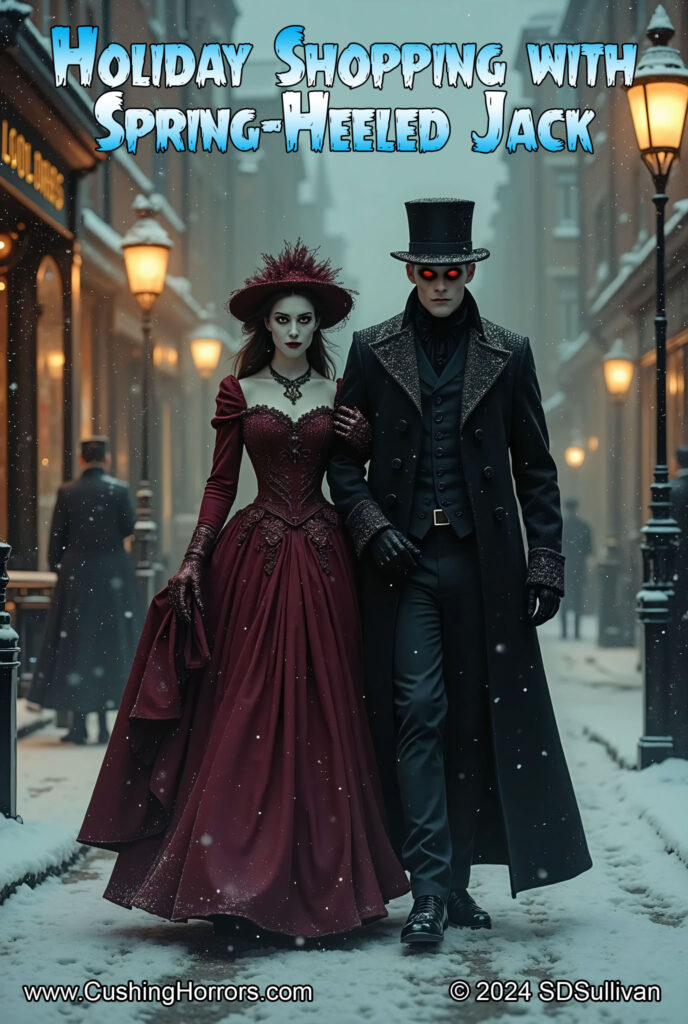
About “Holiday Shopping with Spring-Heeled Jack”
This Cushing Christmas story has been lurking in the back of my mind for quite some time. The first note I have in my commonplace books is from December 20th, 2021, almost 3 years ago. That’s the same year that I wrote “The Bride Reborn,” my original story reviving the Bride of the Monster, from Mary Shelley’s Frankenstein. (Mary’s tale is related to the movie, Bride of Frankenstein, only tangentially. In fact, the Classics Illustrated comic adaptation of Frankenstein is far closer to the original than the film.)
I wrote “The Bride Reborn” for a classic monsters anthology, but through an odd set of circumstances, it didn’t make the cut. That tale remains unpublished, though I’m offering the story as a gift for the 2024 Holiday Season to my newsletter subscribers. (Sign up at www.sdsullivan.com.)
Like my Dracula-based short, “Blood of Dracula,” (published in the Turning the Tied anthology, 2021), “…Bride…” is not only intended as a continuation of and tribute to the classic monster novel, it’s also deep backstory to my Cushing Horrors stories. Those tales started with the novel Dr. Cushing’s Chamber of Horrors (Walkabout Publishing 2020) and continue in my annual Cushing Christmas stories—like this one—and possible future books as well.
If you’ve read Dr. Cushing, you know that it features new characters as well as tributes to Universal and Hammer films and the books from which those two companies derived many of their movies.
So, to date, this is my second story of The Bride, a.k.a. Dr. Mary Elise Angela, though it’s the first to appear publicly, as my 2024 free Cushing Christmas tale.
I hope you’ve enjoyed the story. And I hope, if you haven’t signed up for my newsletter, this will induce you to do so and get “The Bride Reborn” now, rather than waiting until I find a publishing home for it.
And before you ask…
Yes, I know that none of the characters from Dr. Cushing’s Chamber of Horrors appear in this story. Nor do any appear in “Blood of Dracula,” or in “The Bride Reborn.” It will all come together eventually. Trust me.
Maybe some of you clever folks will even anticipate where I’m going.
After writing the first Bride story, I discovered I had plenty of other ideas for her.
I dubbed her “Mary” for Ms. Shelley (and various other reasons), and quickly jotted down my thoughts on her further adventures in my notebooks. I then expanded upon those ideas when transferring them into my voluminous Cushing Horrors series bible.
She gained a full name, notes on her career, and what she might have been up to until the 1920s or early 1930s, when she would likely encounter existing characters from the Cushing series. (Mary was created/destroyed/reborn in 1796, which makes her the second oldest character in the series—so far.)
Among the ideas that sprang into my head (so to speak) were conflicts she might have with other classic monsters. One compelling notion was that Mary should go Christmas shopping with Spring-Heeled Jack.
For those not familiar, this Jack is no relation to Jack the Ripper who started his inglorious career about four decades after this story.
Our spring-heeled fiend is a monster/rogue/legend who first terrified Londoners in October of 1837. History from the time suggests that he may have been a devilish prank perpetrated by young, reprobate noblemen, though all accounts of Jack are weird and sketchy at best. Others chroniclers believed he was some kind of infernal monster, and there’s always the chance that acts attributed to Jack may have been some kind of hallucination or mass hysteria.
Internet accounts report that there were numerous stories written about Jack during his time, with the earliest ones being quite monstrous/villainous. Sadly, the only ones I’ve been able to track down are from near the 20th Century, where Jack had taken on a more Scarlet Pimpernel-type persona.
Obviously, for this Monster Kid author, that wouldn’t work at all!
My Jack had to be a monster, if—at least under Mary’s influence—a fairly tame one. Almost immediately an image of his fiendish countenance in fancy dress on a snowy evening, shopping with his near-human mentor, appeared in my head.
It’s that image that has cropped up every time I’ve needed to write a Cushing Christmas story since—until this year, I decided to just do it, regardless of the fact that Mary Elise Angela’s origin story still (as I write this) hasn’t seen publication.
“The fans will catch up!” I declared to no one but myself. Because I really, really wanted to tell this story. (And it’s about then that I thought of the newsletter gift idea.)
Excited, I set about pouring my thoughts onto the keyboard…
And immediately ran into roadblocks.
Because the middle of the 19th century is not like today, or even like the 1920s-30s, when most of my Cushing tales take place.
And that meant research, research, research!
I wanted to start the story with a snowy street scene…
What were streets like in London in 1847? Were they dirt? Gravel? Cobblestones? Boardwalks? Granite-set pavers, as it turns out.
Did they have sidewalks? Maybe. Probably. But no one mentioned it in accounts from the time—though they clearly had kerbing/kerbs (curbs, to us in the US).
And where in London could one go shopping then—no, not London now, silly internet!—and what shopping area would be close enough to where poor people might live? And what were those places called, and what were street names I might use…?
That kind of research was just the start. I needed to check on fashions, slums, streetlamps, gas lights (?), soup kitchens (not quite yet), expressions (“Piss off!” and “Bugger off!” only came into vogue in the 20th century, apparently), and all the other kind of things you don’t think of when you decide to set a story more than 175 years ago.
Sure, some writers would probably go with what they’d seen on TV and movies, or just make it up, but I always try to make my stories as period accurate—with less sexism and brutality—as I reasonably can.
Even little things like remembering the Brits call cookies “biscuits” and the Swedes call them something different slowed me down. And how did one deliver a batch of cookies before bakery boxes were invented? Or vend chestnuts before anyone had thought of paper bags?
Eventually, I figured out most of that stuff—and my actual story points—to my satisfaction. Though the constant mid-tale research (and making notes in my series bible) slowed me down, I still finished the first draft in four days, between November 20th and 26th, 2024.
I figured that was pretty good, with a family funeral in my recent past, and a wedding and long-delayed premiere of one of my plays looming.
As I write this—on November 27th—I expect that rewrites will take two to five days more, leaving plenty of room to for me to create graphic art titles, possibly a cover, and publish the story on my site in time for Christmas 2024. Life willing.
Often, my stories feature tribute names, and this one is no exception. Little Mary is not named for anyone in particular (I already have a Mary in the story for that). Her name just turned up as the most common for English girls of the period, so I decided to go with it. It also gave me a nice grace note for my monstrous heroine.
Benson is the name of my maternal grandparents, who owned a bakery in Mom’s hometown of Brockton, Massachusetts. So, that one was a slam dunk, even though Grandpa Benson died when I was less than two years old. I don’t remember him, though I did recently find 8mm movies of him at my first birthday—a wonderful treat. And boy, could Nana Benson bake sweets!
Professor Acre is a tribute to my old friend and TSR and Pacesetter, Ltd., compatriot Mark Acres. I dropped the “s” from his surname because I thought “Acre” sounded more British. Being a Quaker Minister, my buddy Mark actually officiated my wedding to Kifflie Scott more than 35 years ago, for which both Kiff and I remain grateful. I thought about having Acre speak with traditional Quaker “thee” and “thou,” but decided that might be too distracting.
Annandale’s Fine Furnishings is named after my friend, author David Annandale, with whom I often carry on IM conversations while working. His ongoing support and encouragement helps keep me on track and spurs me to do my best. Hopefully, I do the same for him.
That’s it for tribute names this time.
I hope to write more stories with Mary and/or Jack in the future. Only time will tell if that happens. I do, however, have a notion to mash-up my Bride of the Monster with another set of famous monster brides.
And if this story proves popular, that can only encourage me to write more Cushing Horror stories, and even the planned three-or-more sequels to the original novel.
If you want all that additional cool monster stuff, drop me a line and let me know.
You can find me on FB, BlueSky, and my site www.stephendsullivan.com or www.sdsullivan.com, for short.
And of course, buying my books and stories or joining my Patreon helps, too.
That’s it for now. Stay safe and well.
Happy Holidays!
—Steve Sullvan
27 November 2024
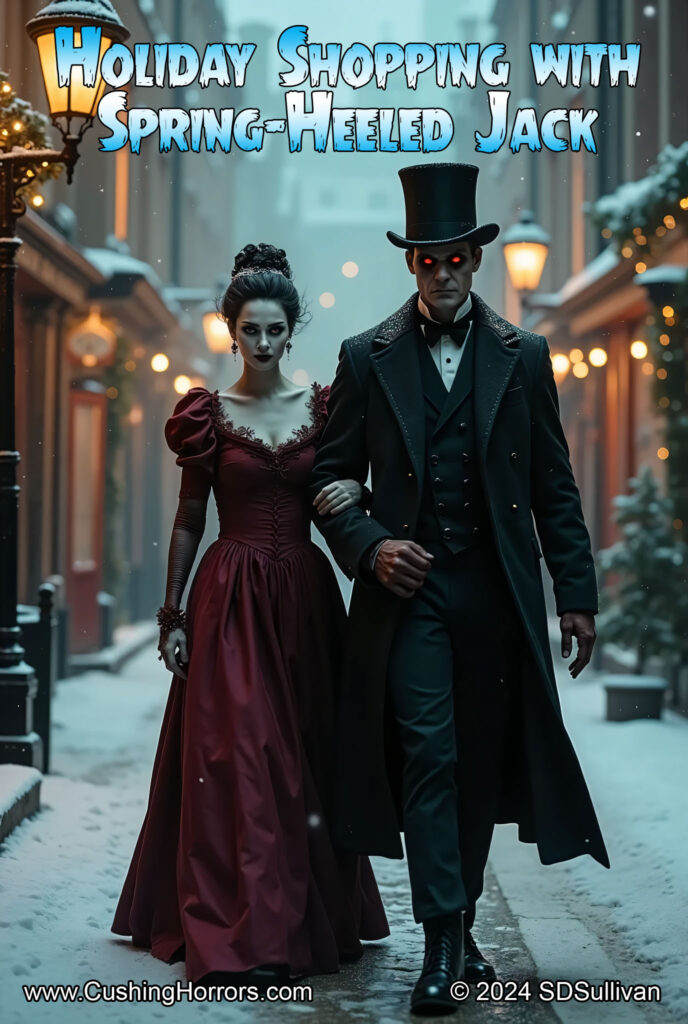
Music to Read by
If you want good music to listen to while reading, I recommend these soundtracks, which I listened to while writing the story:
Sherlock Holmes and the Voice of Terror with The Ghost of Frankenstein by Frank Skinner and Hans J. Salter
The Shadow by Jerry Goldsmith
The Bride of Frankenstein by Franz Waxman
Tubular Bells by Mike Oldfield
A Charlie Brown Christmas (on continue yule-log streaming) by Vince Guaraldi



